Adnan Mahmutovic's Blog, page 2
February 8, 2011
My Only Ever Oedipal Complaint by Omar Sabbagh
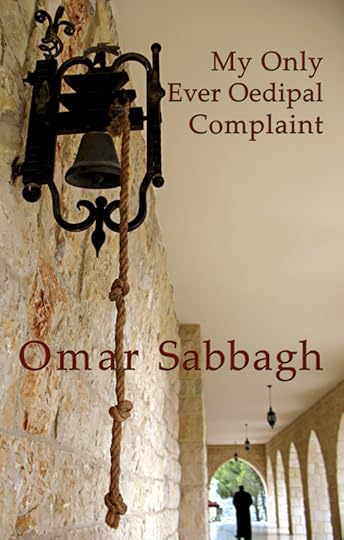 Reading Omar Sabbagh's first poetry collection My Only Ever Oedipal Complaint is to identify with the persona of his poem "The Ancient Discoverer," "All the senses take on luggage." Sabbagh's rich and innovative language, and experiments with form, bring about "A million vital things – about our / pettiness, our littleness, and the moneyed threats / we build out of nothing to satisfy the avarice / of our perversity" (23).There is also something both secular and spiritual in Sabbagh's poems, such as in "Prayer with Dopamine Inhibited," where life is "warm and curious / In the mealy marrow of us" (34).
Reading Omar Sabbagh's first poetry collection My Only Ever Oedipal Complaint is to identify with the persona of his poem "The Ancient Discoverer," "All the senses take on luggage." Sabbagh's rich and innovative language, and experiments with form, bring about "A million vital things – about our / pettiness, our littleness, and the moneyed threats / we build out of nothing to satisfy the avarice / of our perversity" (23).There is also something both secular and spiritual in Sabbagh's poems, such as in "Prayer with Dopamine Inhibited," where life is "warm and curious / In the mealy marrow of us" (34).
Sabbagh moves comfortably through language and yet not always very comforting themes, issues, images. His poesis shows confidence, skill, mastery, but also playfulness. There is particular quality in the ways Sabbagh juxtaposes words in order to bring about new connotations, new meanings, new sensibility. He highlights his use of standard poetic devices. Alliteration and assonance, for instance,are sometimes used in unexpected places, and together with other poetic gestures produce a form of gracious awkwardness: "they cauterise my universe / like the surgeon's mystical specimens / specified by tools" (42). This gives us the sense of love and what it is like, the feelings between parents and children, which are already so skilfully evoked in the title of the collection.This double sense of harmony and conflict between words that produces the sense of human relationships. There is a sense of penetration until"what is left is only a skeleton, a skinnier version / of our former belief in ourselves, but settled, rested" (23).
Most poems are dedicated to parents, friends, etc. The poems dedicated to Sabbagh's father deal with love as poignant as the verses are sharp and controlled. Yet, a part of this love, and the complexity of Sabbagh's work, resides exactly in those verses that seem out of control, and when the mastery of language, form, poeticity take a turn, and partly fail. The reader gets a sense that something raw and disturbing enters the picture.
My Only Ever Oedipal Complaint is published by Cinnamon Press (November 2010)
This review was originally published in Sentinel Literary Quarterly
Filed under: Book Reviews








January 12, 2011
Storm Warning by Vanessa Gebbie

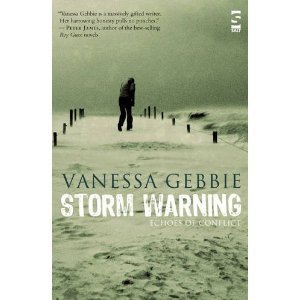 I must say I tried to stay cool before reading Gebbie's new collection of short stories and flash fiction. Her first collection Words From a Glass Bubble was exquisite: the stories were unique and authentic, the characters felt like I'd known them for years, and the narrative voices were both peculiar and particular, and all the more endearing for that. I was both excited and a little skeptical, thinking, No way Gebbie can pull it off again.
I must say I tried to stay cool before reading Gebbie's new collection of short stories and flash fiction. Her first collection Words From a Glass Bubble was exquisite: the stories were unique and authentic, the characters felt like I'd known them for years, and the narrative voices were both peculiar and particular, and all the more endearing for that. I was both excited and a little skeptical, thinking, No way Gebbie can pull it off again.
She did.
And she made every aspect of story-telling appear so natural and unconstrained. It's almost like slipping on ice, Oops, she did it again, made us fall in love with her.
There are many stories that stayed with me. Since I have been through war, I can relate and quite appreciate the way Gebbie treats war. I have particular love for sappers (ever since I read The English Patient), and like Gebbie's treatment of that bizarre profession (I think her father was a sapper).
There is one story that stands out for me, "Letters from Kilburn", which has an epistolary form, and consists of the letters exchanged between an Iraqi boy Karim Hussein and Her Majesty's Deputy Secretary. Karim writes to the Queen to ask for help and after a few standard answers, suddenly we discover a human being, a person behind the "function." I will not reveal much more, but want to stress that for someone who has written fiction myself, this story is a masterclass in this kind of voice. Stories that use this form to make a certain point are most often than not preachy, un-engaging, stiff, formulaic, you get the point. "Letters from Kilburn" gets under my skin.
I cannot recommend Gebbie enough. And I am looking forward to her upcoming novel The Coward's Tale (Bloomsbury).
Filed under: Book Reviews, Short Stories (The New Yorker etc.)








Insignificant Gestures by Jo Cannon

Jo Cannon's Insignificant Gestures speaks through the half-sealed wounds of outsiders, different kinds of refugees, immigrants in and from Africa, and women and children. Cannon's stories make readers live through the transitions and transformations of her characters. She crafts with care, and here I do not mean only that the prose is exquisitely wrought, but that the stories ooze with a certain comforting care for the characters. In "Theresa's Spear," the protagonist explains how Chichewa have "seven words for washing, but none for the emotions that sluiced through me." In another story, we find a sick woman who thinks she has contaminated her dog and caused its seizures.
Cannon makes these snippets of life appear long. The short moments she narrates open up her characters' pasts and histories. Also, we get the sense that wounds take a long time to heal. This healing is like a race towards zeroing out, where everything will return to normal or neutral. Characters as different as an obese man Mick and a traumatised woman such as Nasma grow from this same sensibility. Struggling to lose weight, Mick jokes about wanting to reach a body mass index of zero, a goal that acts as metaphor for what many of the characters are working toward — achieving a trauma-index of zero, where zero would not be the perfect state (of mind), but would entail forgetting and, therefore, represents a different kind of loss.
What struck me most in Cannon's stories was the lack of desire. Desire applies to many yearnings: the desire for something or someone, the wish for a return of one's affection, or the desire for resolutions, for a new life, for peace. So why not a desire to forget? Cannon's characters indeed seem to move in certain directions, but without possessing much desire to push them on. Often their movement is forward, however insignificant it may seem at times. For this reason, the tiny gestures explored in these stories seem all the more miraculous. A touch, a look, a word, things that are barely perceptible, things that may not last more than a second become the long lasting ground for a new life. They are not desired, not even fantasised about. They come as surprises, as openings onto something new, "a pleasant sucking like a child's lovebite."
Interview with Jo Cannon
AM: Welcome, Jo.
JC: Thanks for inviting me to Sweden, Adnan. Great to be here. It's warmer.
AM: Insignificant Gestures is your first collection, but you've been writing stories for some years now. Tell us a little about things that pulled you into writing fiction.
JC: I started my writing life in a support group for doctors. We used reflective writing to help with the emotional side of our work. One exercise was to write in the voice of a patient we found troubling or perplexing. I discovered that I became that person in my imagination and could relate to their problems with greater insight and empathy. Real life stories tend to be tangled and the outcomes can be very sad. I found I enjoyed the creative act of writing, and because I've always read fiction, felt inclined to make up 'better' ones! Of course, I could never use real stories as material. I wanted to share my work beyond our confidential group, so I turned to fiction, where I could control my characters' behaviour and destinies and inject the narratives with a little hope.
AM: I must say that I began reading your book in the waiting room of a hospital with lots of pregnant women and children around me. I do not know if that affected me so that I was more attentive to all the child characters in your stories. Children seem incredibly important, even when they are not the part of an event, as in "Running on the Right Side of the Brain" where you describe an experience as, "a pleasant sucking like a child's lovebite." Can you say something about your focus on children?
JC: I was surprised you thought my book focused on children, but a quick count confirmed they feature in twenty out of twenty-five stories. Kids aren't very visible in western societies but, of course, are a normal part of life and in other places are far more apparent and underfoot. For me, the epiphany of parenthood was the protectiveness I felt towards my children. This rapidly extended to friends' children and then to everyone's. My sons are teenagers now, so I'm conscious of the difficulties of being a young adult. Children suffer most in any adverse situation and are damaged by adult dramas in which they are powerless. I suppose in my stories they are a metaphor for the vulnerability of human beings and the need to protect one another.
AM: I'll go straight to an image in the collection which not only stayed with me but which somehow became a metaphor for many other stories, or rather, the things your characters struggle with. In the story "The Alphabet Diet" the character Mick is extremely obese and in the process of losing weight, he uses this body mass index. Now, the ideal index is zero. To me this became a metaphor of the existential issues that most of your characters deal with. They seem to reach for some state of being which is zero, that is, without the things that burden them. Yet, paradoxically, I assume in the state zero they'd also boil down to nothing, they'd disappear. I may be pushing it a little but that was the sense I got, that they both want to rid themselves of their burdens and also fear that zero-point in life.
JC: That is certainly the point made by Mick in "The Alphabet Diet." He's joking because the ideal BMI is 18 to 25. Most of my characters, as you point out, are in existential crisis. With the exception perhaps of Eve, they all have troubled minds as a result of difficult life events. Each one has developed a different strategy for dealing with this because the human psyche reaches naturally towards light and hope. Sometimes the strategy is harmful to others, as is Andre's obsessive love in "Shutters." Others chose work, or running, or exhibitionism. Most of my characters are imprisoned by habits of thought and behaviour and need the input of another to change their lives.
AM: How did you decide to write about different kinds of refugees, or immigrants? What drew you to this?
JC: I'm a G.P. in an inner city practice and most of my patients are from ethnic minorities. Many have settled for several generations; others are recent immigrants. Sheffield prides itself as "The City of Sanctuary" and some of the people I work with are refugees. The fantastical journeys, the stringencies and courage that take people from one side of the world to another, astound me. Post traumatic stress syndrome, common in this group, affects the brain biochemically. As with most altered mental states—panic disorder, depression—a protective brain reaction outlives its usefulness and takes on an existential meaning. In "Nasma's Malady," I describe the psychological sequel rather than the harrowing details of her attack. Other characters—in "One Hundred Days" and "A Good Match"—experience PTSD due to an assault on their sense of self. In "Needle-stick baby" and "Fairy Story," the protagonists suffer similar altered brain chemistry following emotional trauma. The capacity of the mind to respond to shocking events in the same way connects us as human beings.
AM: Some of your characters are Muslim. The issue of what it means to be a Muslim has been dealt with in terms of a lot of stereotypes. How did you approach it? Can you give me a few examples of how you dealt with the identity of someone for instance from Pakistan as in "A Good Match?" Arranged marriage is one of those overexploited themes.
JC: Although some of my characters are Muslim, this isn't their defining feature. Nor is their faith central to their lives. "A Good Match" describes an imaginary family in a group with a specific history and alludes to the pressures put on some young people to maintain marriages that seem predestined to fail. But really, this story isn't about arranged marriage, which is practiced diversely by different families and groups, any more than it is about religion. Mainly, I wanted to explore why a young man who is not violent by nature might become so and the devastating effect this has on him. Rather than concentrate on the victim of domestic violence, I hoped to show that Siddique, the perpetrator, is a casualty too.
AM: Religion seems to play an important role in several stories. It is both important and tangential. I mentioned the Muslims, but there is also the "missionary" theme. Tell us about your relationship to religion. How do you look upon work with refugees? What part does religion have in it?
JC: Many religious experiences are compelling because they are caused by altered brain biochemistry. In "Hand of God," for example, Ryan's religiosity is a manifestation of obsessive-compulsive disorder and the aura of migraine. At some level he recognises this, so his relationship with the cult is ambivalent from the start. He sees John, the group's spiritual leader, manipulate the piety of others to deceive and control: a commonplace abuse of religious power. The protagonist in "Eye of the Storm" believes that faith should not be flaunted, or even discussed, but practiced as discretely as any other deeply personal activity. The nun in "Theresa's Spear" chooses a life of emotional deprivation until she realises that her craving to give and receive love is completely normal. She finds she can no longer conceive of a deity who allows extreme suffering. Like her, I believe we should hold hands as we creep through the dark forest because no one else is going to help us.
Professionally, I notice that the significance of religion to an individual varies and cannot be assumed. For some it is the profound centre of their lives; for others it is mild sentimentality, superstition, or a set of cultural customs. Inner resources and sustaining relationships seem to have more bearing on the ability of a human being to negotiate the difficulties of life and death. Many patients deliberately choose a doctor who does not share their faith, or any faith, assuming they will be less judgmental. Of course I respect people's observances—they impact on medical management—but beliefs are less important than the humanity we share.
AM: I couldn't help thinking about certain recurring names, such as Eve, which appears a few times. The book ends with "Jam" where Eve returns as the protagonist.
JC: Eve is a recurring character who appears, at different stages of her life, throughout the collection. We meet her first as a child in "Evo-stik" and the book ends with her death in "Jam."
Eve is a contrast to the more lost and isolated characters. In some ways, she is an outsider too—an observer who doesn't quite fit in. But she is grounded in family, so signifies 'belonging.' Her long-running love story with Tim threads through the book. "Jam" is a metaphor for her life, or any life.
AM: I wonder about your style. At times, in your stories about immigrants, I felt I wanted to see a different way of narrating, maybe some different sensibility, or tone, or voice. Then it struck me that the fact that my expectations were not met, actually added to the sense of the gap between the character and his or her environment, a sense of discomfort. The feeling that the voice and the character did not quite fit produced the effect of characters standing outside themselves. I had a similar experience reading Leila Aboulela's novels The Translator and Minaret.
JC: I don't know Abouela's novels so have just ordered The Translator! Many of my characters—the protagonists in "One Hundred Days," "Nasma's Malady," "A Good Match," and Abida in "Daddy's Girl" are intelligent people rendered powerless by their poor command of English. I've seen this often with patients, and it is deeply frustrating for people articulate in their own languages. My stories don't attempt to convey the sound of their limited speech but rather the content of their inner worlds. Although their experiences are unique, their mental reactions are universal—hence the commonality. I want to give a voice to people who would otherwise be speechless.
AM: Do you want to say anything else, something I have not picked upon but you feel you want to convey to your readers.
JC: No, thank you, Adnan. You have really stretched my brain!
AM: Thank you for this conversation.
JC: Thanks so much for this opportunity to talk about my book and for the close interest and respect you have shown my work.
Insignificant Gestures is available from Pewter Rose Press or Amazon. Visit Jo Cannon at jocannon.co.uk
Filed under: Book Reviews, Interviews








May 28, 2010
"Not so Perfect" by Nik Perring
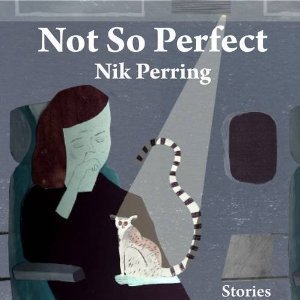 Nik Perring's little pocketbook is a gift. A pocketful of 22 flash stories, perfect little glimpses into 22 not so perfect lives. At times it feels as if we are thieves surprised by the return of the tenants we wanted to rob, and instead of stealing we just happen to witness intimate moments. Still, we sneak out richer.
Nik Perring's little pocketbook is a gift. A pocketful of 22 flash stories, perfect little glimpses into 22 not so perfect lives. At times it feels as if we are thieves surprised by the return of the tenants we wanted to rob, and instead of stealing we just happen to witness intimate moments. Still, we sneak out richer.
Perring's stories are accompanied by minimalist drawings that remind me of Paul Klee's drawings of angels. A perfect match.
There is magic in Perrings realism. It's a mundane...
May 12, 2010
Words from a Glass Bubble
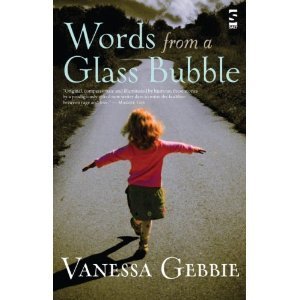 To read Words from a Glass Bubble by the Welsh author Vanessa Gebbie is like having a talk with your most intimate and yet secret friend, a companion that will take you deep into its soul white at the same time touching yours.
To read Words from a Glass Bubble by the Welsh author Vanessa Gebbie is like having a talk with your most intimate and yet secret friend, a companion that will take you deep into its soul white at the same time touching yours.
The stories in Gebbie's collection are like bubbles within bubbles, magical and multilayered. Simple, mundane lives of her characters ooze emotive richness, often against the background of Biblical contexts, which Gebbie truly brings down to earth and explores in their e...
January 29, 2010
Grandma and Death
In June 2008, I didn't know how to ask my grandma to fake death.
Even though she shouldered eighty years, her back was remarkably straight. She had the liveliest eyes, and a toothless smile, both smart and shy. She avoided any commotion and conflict. She had broken her left hip some twenty years earlier and now that she had been living in Sweden since the outbreak of the Balkan war, she still refused to have it fixed, properly this time. She would sit ten inches from the TV-set, with her good ...
July 16, 2009
"Tag" by Stephen May
 Cinnamon Press treats their readers to this wonderful weave of two sides of a disturbing chain of events between a young Talented and Gifted (TAG) student Mistyann and her older teacher.
Cinnamon Press treats their readers to this wonderful weave of two sides of a disturbing chain of events between a young Talented and Gifted (TAG) student Mistyann and her older teacher.
The prose is raw and a little sentimental despite its irony, which keeps me riveted. We move from the male to the young female mind, which are of course quite different. This texture only strengthens their particular and peculiar relationship.
Posted in Book Reviews






"Mother of the Believers" by Kamran Pasha
They say behind every great man there is a woman. In his i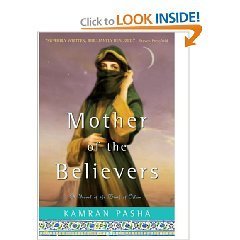 ntimate story about the early years of Islam, Kamran Pasha suggests that behind a historical giant such as Muhammad there is a girl, her co-wives, a community, and of course the creator. Although Pasha tries to tell a story of an individual woman, Aisha bint Abu Bakr, the youngest wife of the Messenger of Islam, the story cannot but be about a community, which developed from a crowd of both slaves and nobility, both women and men, and ...
ntimate story about the early years of Islam, Kamran Pasha suggests that behind a historical giant such as Muhammad there is a girl, her co-wives, a community, and of course the creator. Although Pasha tries to tell a story of an individual woman, Aisha bint Abu Bakr, the youngest wife of the Messenger of Islam, the story cannot but be about a community, which developed from a crowd of both slaves and nobility, both women and men, and ...
June 29, 2009
"Breadgivers" by Anzia Yezierska
This post has been written by Irma Crnkic, a Bosnian student of English literature.
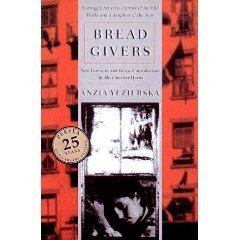 After reading Breadgivers by Anzia Yezierska nothing seems impossible anymore, or at least, not as difficult as it was at first.
After reading Breadgivers by Anzia Yezierska nothing seems impossible anymore, or at least, not as difficult as it was at first.
Sara Smolinsky is the brave protagonist in this partly autobiographical story. Through Sara, the author, another survivor from the New York suburbs, voices all injustices and obstacles women had to face. The New York is dreary and drab. She realizes at a very young age that life is...
June 8, 2009
"The Moon in Its Flight" by Gilbert Sorrentino
Note: This essay is written by a new guest blogger, Therese Säde, Stockholm, Sweden.
An Unconventionally Conventional Love Story
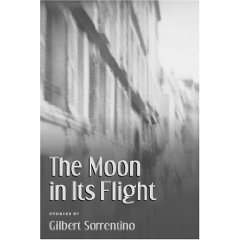 In the introduction to the short story collection My Mistress's Sparrow is Dead, Jeffrey Eugenides argues that love stories give love a bad name. In support, he recounts the story of the Latin poet Catullus and the poems he wrote for Lesbia. Eugenides is particularly interested in Lesbia's sparrow. The love of the sparrow prevents Lesbia from giving all of her love t...
In the introduction to the short story collection My Mistress's Sparrow is Dead, Jeffrey Eugenides argues that love stories give love a bad name. In support, he recounts the story of the Latin poet Catullus and the poems he wrote for Lesbia. Eugenides is particularly interested in Lesbia's sparrow. The love of the sparrow prevents Lesbia from giving all of her love t...



